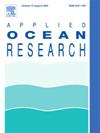Kernel adaptive filter-based channel prediction for adaptive underwater acoustic OFDMA system
IF 4.3
2区 工程技术
Q1 ENGINEERING, OCEAN
引用次数: 0
Abstract
This paper presents a dynamic adaptive forgetting sparse kernel recursive least squares (DAFS-KRLS) model for predicting time-varying underwater acoustic (UWA) channels and applies it to an adaptive orthogonal frequency-division multiple access (OFDMA) system. By introducing an offline-online joint training mechanism, the DAFS-KRLS model adapts to the time-varying nature of UWA channels, thereby improving the real-time performance and stability of channel prediction. Simulation and sea trial data are used to validate the DAFS-KRLS model, with comparisons to traditional recursive least squares (RLS), approximate linear dependency based KRLS (ALD-KRLS), and convolutional neural networks (CNN) combined with long short-term memory (LSTM) models (CNN-LSTM). Experimental results show that the DAFS-KRLS model achieves robust performance even with a smaller data volume, outperforming other models in accuracy and stability.
基于核自适应滤波器的自适应水声OFDMA信道预测
提出了一种用于时变水声信道预测的动态自适应遗忘稀疏核递归最小二乘(DAFS-KRLS)模型,并将其应用于自适应正交频分多址(OFDMA)系统。DAFS-KRLS模型通过引入离线-在线联合训练机制,适应UWA信道的时变特性,提高了信道预测的实时性和稳定性。利用仿真和海试数据验证了DAFS-KRLS模型,并与传统的递归最小二乘(RLS)、基于近似线性依赖的KRLS (ALD-KRLS)和卷积神经网络(CNN)结合长短期记忆(LSTM)模型(CNN-LSTM)进行了比较。实验结果表明,DAFS-KRLS模型即使在较小的数据量下也具有鲁棒性,在精度和稳定性方面优于其他模型。
本文章由计算机程序翻译,如有差异,请以英文原文为准。
求助全文
约1分钟内获得全文
求助全文
来源期刊

Applied Ocean Research
地学-工程:大洋
CiteScore
8.70
自引率
7.00%
发文量
316
审稿时长
59 days
期刊介绍:
The aim of Applied Ocean Research is to encourage the submission of papers that advance the state of knowledge in a range of topics relevant to ocean engineering.
 求助内容:
求助内容: 应助结果提醒方式:
应助结果提醒方式:


